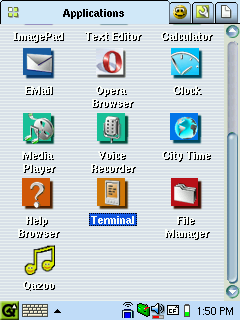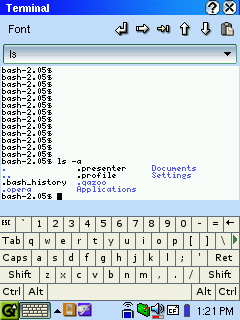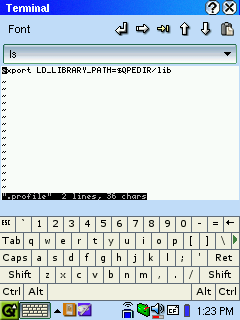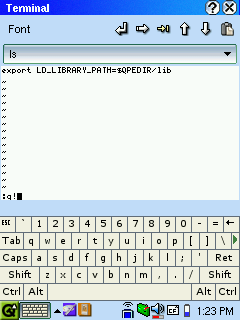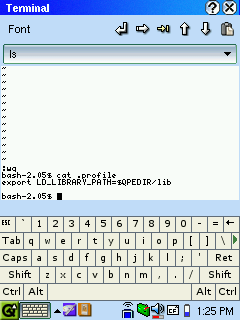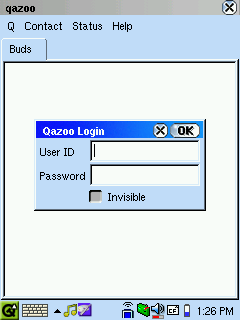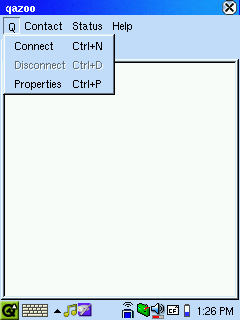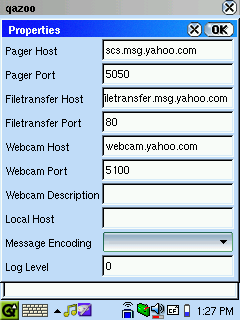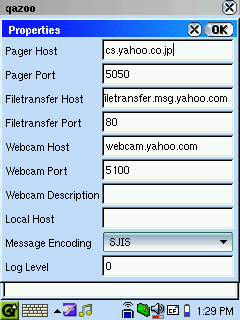Installation
Introduction
Installation isn't terribly tough if you are just interested in Yahoo!
North America.
Conventions
This documentation talks mostly about installation right now. It
contains details about transfering files to your zaurus, installing
packages and using the Sharp Zaurus. It assumes you have a
fundamental understanding of the Sharp Zaurus such as launching
applications, transfering files to it and installing packages.
There is a section of this document that attempts to teach you all you
need to know to use the vi editor to append a value to your
LD_LIBRARY_PATH. It assumes you have the installation files for
the Sharp Zaurus SL-5600. For it you need to install the Terminal
application and work from the command-line. In this section ,
things you should type on the command line will be in
italics. Things you should
enter into vi will be in "double quotes". Be mindful of things
like colons(:), excalmation points(!) and back slashes(/) for they are
important in vi and shell files. If you should follow something
by a return it will say <RET> within the "double quotes".
So if you should type the colon followed by an s and then press
enter it will say: ":s<RET>". Sometiems you will be asked
to press the escape key. When this happens it will say
<ESC>. This is on the little software keyboard in the
toolbar of Qtopia in the upper left hand corner. It is probably
best ot use the little keyboard in the toolbar for terminal sessions
since it contains a full keyboard. When you are in vi you can
position the cursor using the thumbpad just like any other text editor.
Download
Go to the downloads page and grab the ipk files for qazoo and
libyahoo2. Transfer these onto your Zaurus using the file manager.
Qazoo
Download Page
Grab the latest libyahoo2 and qazoo ipk files. As of this writing
the latest libyahoo2 is 0.7.2a and the latest qazoo is 0.5.
Install Packages
Use the Add/Remove Software application to install the packages onto
your Zaurus. Install Libyahoo2 first then install qazoo.
There is qazoo at the bottom. The yellow musical note.
What if it doesn't start? (SL-5600 ROM Special Instructions)
I recently upgraded my SL-5500 to the SL-5600 ROM and got a surprise.
Qazoo doesn't start anymore. No problem. I discovered
the LD_LIBRARY_PATH isn't set. Here is how you fix that.
The following instructions are not for people who are squeemish about
messing with configuration files. If you have a linux
configuration and you modify your .profile all of the time you will be
fine. I cannot be resopnsible for any damage you do to your
Zaurus in the process of the steps below. I repeat, if you are
squeemish about modifying system files stop here. There is
potential here that if you make a mistake you can do permament damage
to your configuration which will cause your Zaurus to stop booting.
Now on with the fun!
Install the Terminal application onto your sharp zaurus. This is
is delivered with the installation files for the SL-5600 ROM.
Just install it the same way you installed Qazoo. Now that
you have Terminal installed start it.
Enter qazoo<RET> at the command-line and see what it says.
bash-2.05$ qazoo
It should complain about missing shared library libyahoo2. If it
doesn't complain about missing shared libraries and it still doesn't
start you may want to send me an e-mail with what it did say.
Something else is wrong.
If you got the message about missing shared libraries go ahead with
what this says below.
You need to create a .profile in /home/zaurus. Don't worry.
It isn't as difficult as it sounds! Just start Terminal.
It starts in the directory where you need to make the file.
Once it starts check if you already have a .profile by typing:
bash-2.05$ ls -a
If you already have a .profile, make a backup:
bash-2.05$ cp .profile
profile.backup
If you already have a .profile make sure you can write to it:
bash-2.05$ chmod +w .profile
Now lets create or modify your .profile! :)
Enter this at the command-line:
bash-2.05$ vi .profile
Okay, now that you are in vi I should give you some pointers.
This is quite a powerful text editor. But you don't need to
know a lot to get started. Vi has a command mode and an edit
mode. Vi starts in command mode. In command mode you can
position the cursor, delete characters, delete lines, save, exit and a
lot more. In edit mode you can enter text. To enter edit
mode you press the "a" or "i" characters. To delete a character
position the cursor over the character and press "x". You can
only delete characters in the command mode. To leave edit mode
and go back to command mode you press the <ESC> key. To
exit without saving, enter ":q!<RET>" in command mode.
(<ESC> doesn't mean to press "<" then "E" then "S" then
"C" then ">". It means to press the ESC key on your keyboard.
Same goes for <RET>.)
Now, if you are looking at a blank file you merely need to press "i" to
insert text. Enter this line:
export LD_LIBRARY_PATH=$QPEDIR/lib
Press <RET> at the end of the line so there is one blank line at
the end of the file. Press <ESC> to go back to command mode.
If you don't see a blank file, you need to look and see if there is
already a line starting with "export LD_LIBRARY_PATH=" or just
LD_LIBRARY_PATH=". If there is use the thumbpad to move the
cursor down to that line. Press "$" to move the cursor all of the
way to the end of the line. Now type these characters:
":$QPEDIR/lib". This adds to the list of directories already
configured for the LD_LIBRARY_PATH. Press <ESC> to go back
to command mode.
Now take a look at what you did. Does it look right? Verify
that you used underscores and not hyphens in LD_LIBRARY_PATH.
Verify that QPEDIR is all capitals. Verify that lib is all
lower case. Verify there is a space between export and
LD_LIBRARY_PATH. Verify there is a "$" character in front of
QPEDIR. Verify there is a forward slash "/" between $QPEDIR and
lib. Verify there is an equals "=" between the LD_LIBRARY_PATH
and $QPEDIR. If you already had an LD_LIBRARY_PATH entry in your
.profile verify there is a colon ":" between the existing
LD_LIBRARY_PATH and ":$QPEDIR/lib". Make sure there is one blank
line at the end of your .profile.
Now if you got this much and you are happy with it, press capital z
twice to save and exit "ZZ". Alternately you can enter
":wq<RET>.
If you are not happy with it press ":q!<RET>" to exit. This
tells vi to exit without saving. Nothing will have been changed.
If you want to review your .profile before proceeding type this at the
command-line:
bash-2.05$ cat .profile
Verify that what you see looks correct again. If it doesn't
revert.
If you don't want to use this .profile and you didn't have a .profile
in the first place then just delete it:
bash-2.05$ rm .profile
If you already had a .profile and you made a backup like I suggested
above copy the backup over your changed .profile
bash-2.05%
cp profile.backup .profile
If you are happy with you changes and want to try it out,
reboot your zaurus and try starting qazoo. If all went well qazoo
will come up like normal.
Configuration for Yahoo!JAPAN users.
If you would like to see installation instructions in Japanese go
here.
If you are a Yahoo!JAPAN user you are in luck! Qazoo has been
tested to work with Yahoo!JAPAN using Japanese characters. To do
this you need to change some properties. Qazoo profides a GUI for
this! :)
First start qazoo. Don't login yet. Just close the Qazoo
Login window by clocking on the X on it.
Now bring up the Properties dialog:
And click on properties. You should see the default properties:
Now change "Pager Host" to cs.yahoo.co.jp and Message Encoding to SJIS:
Click on OK and select Connect from the Q menu. Now login like
normal and message away!
There have been problems reported while connecting with Yahoo!JAPAN.
Sometimes the server closes the socket while connecting. If
this happens just try to connect again. Qazoo should let you try
to connect until it works.
If you are chatting with Yahoo!JAPAN and all you see are little
squares, you are missing the Japanese fonts. I'm not sure where
to get those just yet. I do know there are users chatting in
Japanese using the Japanese ROMs for their Zaurus.








